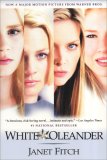Summary | Excerpt | Reading Guide | Reviews | Readalikes | Genres & Themes | Author Bio

As she signed her books, she wore her customary half-smile, more internal than outward, having a private joke while she thanked everybody for coming. I knew she was waiting for a certain man. I'd already seen him, a shy blond in a tank top with a bead-and-yarn necklace, who stood in the back, watching her, helpless, intoxicated. After twelve years as Ingrid's daughter, I could spot them in my sleep.
A chunky man, his dark hair pulled back in a curly ponytail, pushed in, offered his book to be signed. "Barry Kolker. Love your work," he said. She signed his book, handed it back to him, not even looking into his face. "What are you doing after the reading?"
"I have a date," she said, reaching for the next book to sign.
"After that," he said, and I liked his self-confidence, but he wasn't her type. He was chubby, dark, and dressed in what looked like a suit from the Salvation Army.
She wanted the shy blond, way younger than her, who wanted to be a poet too. Of course. He was the one who came home with us.
I lay on my mattress on the screen porch and waited for him to leave, watching the blue of the evening turn velvet, indigo lingering like an unspoken hope, while my mother and the blond man murmured on the other side of the screens. Incense perfumed the air, a special kind she bought in Little Tokyo, without any sweetness, expensive. It smelled of wood and green tea. A handful of stars appeared in the sky, but in L.A. none of the constellations were the right ones, so I connected them up in new arrangements: the Spider, the Wave, the Guitar.
When he left, I came out into the big room. She was sitting cross-legged on her bed in her white kimono, writing in a notebook with an ink pen she dipped in a bottle. "Never let a man stay the night," she told me. "Dawn has a way of casting a pall on any night magic."
The night magic, it sounded lovely. Soon I would have lovers and write a poem after. I gazed at the white oleanders she had arranged on the coffee table that morning, three blossoms representing heaven, man, and earth, and thought about the music of her lovers' voices in the darkness, their soft laughter, the smell of the incense. I touched the flowers. Heaven. Man. I felt on the verge of something, a mystery that surrounded me like gauze, something I was beginning to unwind.
All that summer, I went with her to the magazine. She never thought far enough ahead to put me in a Y program, and I never mentioned the possibility of summer school. I enjoyed school itself, but it was torture for me to try to fit in as a girl among other girls. Girls my own age were a different species entirely, their concerns as foreign as the Dogons of Mali. Seventh grade had been particularly painful, and I waited for the moment I could be with my mother again. The art room of Cinema Scene, with its ink pens and a carousel of colored pencils, table-sized paper, overlays and benday dots, border tape, and discarded headlines and photographs that I could wax and collage, was my paradise. I liked the way the adults talked around me; they forgot I was there and said the most amazing things. Today, the writers and the art director, Marlene, gossiped about the affair between the publisher and the editor of the magazine. "A bizarre bit of Santa Ana madness," my mother commented from the pasteup table. "That beaky anorexic and the toupeed Chihuahua. It's beyond grotesque. Their children wouldn't know whether to peck or bark."
They laughed. My mother was the one who would say out loud what the others were thinking.
I sat at the empty drafting table next to my mother's, drawing the way the venetian blinds sliced the light like cheese. I waited to see what my mother would say next, but she put her headphones back on, like a period at the end of a sentence. This was how she pasted up, listening to exotic music over headphones and pretending she was far away in some scented kingdom of fire and shadows, instead of sitting at a drafting table at a movie magazine pasting up actor interviews for eight dollars an hour. She concentrated on the motion of her steel X-acto knife, slicing through the galleys. She pulled up long strips that stuck to the knife. "It's their skins I'm peeling," she said. "The skins of the insipid scribblers, which I graft to the page, creating monsters of meaninglessness."
© 1999 by Janet Fitch. Reprinted with permission of the publisher, Little,Brown & Co.
Your guide toexceptional books
BookBrowse seeks out and recommends the best in contemporary fiction and nonfiction—books that not only engage and entertain but also deepen our understanding of ourselves and the world around us.